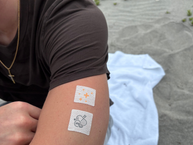Are you on a recent health kick? Have you always been interested in establishing a healthier future for yourself? Are you wondering what else you can do to support your body? Taking a look at the vitamins and minerals that your body needs is a great way to support health goals.
Vitamins and minerals are necessary for every function of your body. They may not be as popular of a topic as, say, carbs and protein, but they are just as important. With supplements such as PatchAid Topical Vitamin Patches, they are just as easy - or even easier - to get. Here are 10 essential vitamins and minerals that you need for optimal health.
Vitamin A
Vitamin A is necessary for healthy skin, normal vision, and normal immune function. When it comes in plant-based foods or certain supplements, vitamin A is in the form of carotenoid, such as beta-carotene, which is an antioxidant.
Sources of vitamin A include liver, butter, orange vegetables and fruits, such as cantaloupe, carrots, winter squash, and sweet potatoes, and other fruits and vegetables, such as spinach and kale. People who are at greater risk for vitamin A deficiency include those who are bariatric surgery patinets or who have a fat malabsorption disorder.
B Vitamins
There are several B vitamins. They include biotin, vitamins B1, B2, B3, B5, B6, and B12, and folic acid, sometimes known as B9. They are required for metabolic functions, such as breaking down and getting energy from fats, proteins, and carbohydrates in foods. They are also needed for energy-producing reactions, as well as for producing healthy red blood cells.
Just as though there are a variety of B vitamins, there are a variety of foods in which they are found. Fortified and whole grains and cereals, nuts, meat, poultry, seafood, beans, eggs, fruits, vegetables, and dairy products all have B vitamins. Bariatric surgery patients, older adults, people who abuse alcohol, people who follow plant-based, or vegan, diets, and people who do not eat fortified grains can be at higher risk for deficiency of some B vitamins.
Vitamin C
Vitamin C is an antioxidant vitamin and is needed for normal immune function, production of collagen for skin, joints, and blood vessels, and for absorbing iron.
Fruits and vegetables are the best natural sources of vitamin C. Kiwi fruit, oranges and other citrus fruit, mango, strawberries, cantaloupe, onions, broccoli, cauliflower, potatoes, bell peppers, and tomatoes are some good sources. Most people don’t have a severe vitamin C deficiency, but some people believe that getting a higher amount of vitamin C is helpful. People who smoke have higher vitamin C needs.
Vitamin D
Fatty fish and egg yolks are natural sources of vitamin D. Fortified milk is a major source of vitamin D in the US, and fortified orange juice, milk substitutes and cereals often have added vitamin D. Low vitamin D levels are common, and people at greater risk include those who do not drink milk, people with darker skin, people who live in northern climates, people who use sunscreen or who cover their skin when they are outside, and older adults.
Vitamin E
Vitamin E is needed for heart health, and it is an antioxidant.
Sources of vitamin E include nuts, vegetable oils such as flaxseed and canola oil, and wheat germ. Vitamin E needs are higher among people who eat a high-fat diet, such as many low-carb or keto plans.
Vitamin K
Vitamin K is needed for normal blood clotting to prevent hemorrhage, or excessive bleeding, from cuts and bruises. It is also essential for heart and bone health, likely related to its role in using calcium. Without enough vitamin K, too much calcium may remain in the blood instead of going into bone mineral, and this can lead to a higher risk for bone fracture and also to atherosclerosis.
The most abundant form of Vitamin K in the diet is phylloquinone, or vitamin K1. It is in leafy green vegetables, such as spinach, kale, and mustard greens. Another form, vitamin K2, is less common, but still beneficial. Sources include fermented foods, such as natto and sauerkraut. People who do not eat leafy green vegetables may be getting lower amounts of vitamin K1.
Calcium
Calcium is a mineral that is a primary component of bone mineral. It is also needed for normal muscle contraction in both skeletal and cardiac muscle.
Calcium sources include milk and other dairy products, as well as fortified milk substitutes and fortified orange juice. People who avoid dairy products or who follow a plant-based or vegan diet may be low in calcium.
Iron
Iron is part of a healthy immune symptom, and it's needed for developing healthy red blood cells. A deficiency can lead to anemia, or weakness, shortness of breath, and fatigue, as well as frequent infections.
Meat, shellfish, egg yolks, and other animal-based products have iron. So do beans, lentils, nuts, and whole and fortified grains, but absorption can be low. Not everyone needs an iron supplement or is at risk for low iron levels, but iron deficiency is the most common mineral deficiency in the world. Females of child-bearing age, people with malabsorptive disorders or IBS, and bariatric surgery patients may need extra iron.
Magnesium
Magnesium is needed for bone health, as well as for normal energy production. it is also needed for normal moods and muscle and mind relaxation.
Chocolate, wheat germ, nuts, leafy green vegetables, and whole grains have magnesium, but many people are low in it.
Zinc
Zinc is essential for normal immune function, as well as for energy production.
Sources of zinc include shellfish and lentils. Bariatric surgery patients can be low in zinc, as can people following a strict vegan diet.
Topical Vitamin and Mineral Patches
There are certainly a lot of essential nutrients, but taking them as supplements doesn’t have to be complicated. One solution is to use vitamin patches. Stick on a patch, leave it on for up to eight hours, and discard it when you’re done. Repeat the next day with a new patch.
That’s it! There’s no need to worry about stomach discomfort, taking vitamins with or without food, swallowing a horse-sized capsule, or chewing a chalky tablet. You can shower, work out, or sleep with your patch on. And they come in discrete clear or light brown options.
PatchAid Topical Vitamin Patches are easy to obtain. You can purchase them online in a supply of 30 days or 3, 6, or 12 months. You can also take advantage of special programs and discounts, such as the following.
- Free shipping on select purchases
- Discounts and free shipping when you sign up for auto-deliveries, at intervals of your choosing, so you never run out
- A rewards program that lets you accumulate points and exchange them for deep discounts at checkout
When you are ready to try a new type of vitamin supplement or to try vitamins for the first time, PatchAid Vitamin Patches are there for you. Just talk to your healthcare provider about which may be right for you. Remember, you can use up to eight patches at once, so you can browse the store and see which ones can help you reach your nutritional and health goals.
*The Food and Drug Administration has not evaluated these statements. PatchAid products are not intended to diagnose, treat, cure or prevent any disease. Anyone with a medical condition should seek the advice of a licensed medical practitioner. Individual results may vary.







